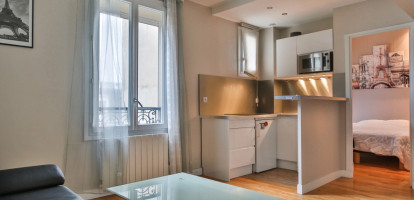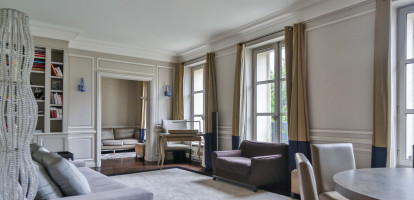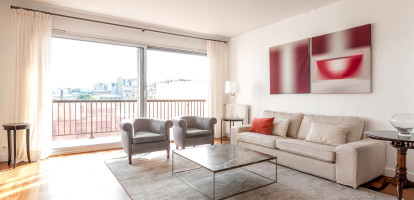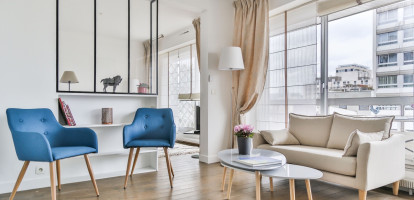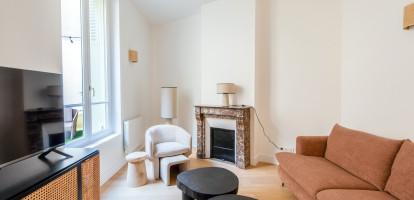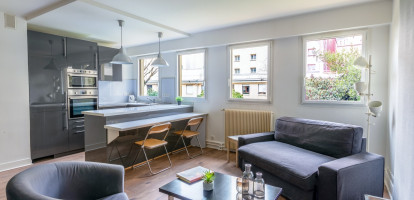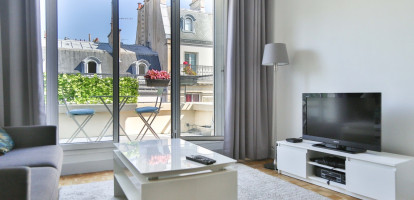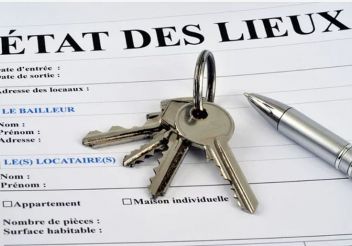Pack your bags and prepare for the adventure of a lifetime: moving to Paris from the States! Paris will bring you its rich culture, delicious cuisine, and elegant Parisian charm. But before you take off, let's address a few of the most frequently asked questions that American expats ask before moving to Paris across the Atlantic.
Can I live in Paris as a US citizen?
Absolutely! Living in Paris as an American citizen is entirely possible. However, it's crucial to comply with French visa requirements.
How long can I live in Paris as an American?
For the first 90 days in France, you're golden without a visa.
However, depending on your plans, you may need to obtain a long-stay visa, allowing you to reside in France for more than 90 days. Ensure you check the specific visa regulations that apply to your situation.
Applying for a long-stay visa (VLS-TS) in France - Your long-term residence permit in France
The long-stay visa (VLS-TS - Visa de Long Séjour Valant Titre de Séjour) acts as a residence permit for Americans moving to Paris for an extended stay. This authorization allows you to live and explore the beauty of Metropolitan France for an extended period.
Different Categories of Long-Term Stay Visas
Here are different categories of long-term stay visas in France that you can apply for according to your situation:
- Prolonged stay for an extended period for tourist or personal reasons;
- Pursuit of a professional activity;
- Pursue of studies;
- Joining family members.
Can I move to Paris without a job?
Sure thing! While it's good to have a job lined up before departing for your new life in Paris, it's not a sine qua non because you can obtain a long-stay visa for tourists and study reasons to stay in France for the long term.
However, it's essential to have some financial stability and a plan of action to support yourself for your future life in Paris. Getting a job in Paris will increase your budget, enrich your expatriate experience, and make your rental apartment hunting in Paris easier. Because French landlords often prioritize the job stability of potential tenants. Having a job can be a significant advantage when searching for a rental apartment in Paris, making the process smoother and more favorable.
How hard is it to get a job in Paris as an American?
Finding a job in Paris as an expat can be challenging, especially if you don't speak French; don't let that scare you off. There are plenty of job opportunities in Paris for expats. Having English as your native language and know-how about the US market is always precious in France's job market. Knowing a little French is a plus, and networking, searching for jobs online, and tapping into expat communities can help you open the doors of the job market wide.
Top sites for expatriates looking for work in Paris:
- LinkedIn
- Indeed France
- Glassdoor
- Monster France
- Welcome to the Jungle
- Paris Anglo
In any case, you can always consider remote work for American companies. With the rise of telecommuting, many Americans find opportunities to work remotely while enjoying the Parisian lifestyle. This option offers flexibility and the chance to collaborate with international teams.
Do I need a work visa to work in Paris as an American?
Yes, as an American, you must have a work visa for France and a work permit (Autorisation de travail) to work legally in Paris or anywhere else in France. All non-EU and non-EEA individuals intending to work in France for over 90 days, either by accepting a job offer from a French employer or engaging in long-term employment, research, or specialized projects, are required to obtain both a work visa and permit. Failure to comply could lead to legal repercussions such as fines, deportation, or a ban on re-entry into the country.
French work visa and work permit requirements and process
- Job Offer from a French employer: First, you need to find a job with a French employer, who will play an essential role in your work visa application process, as they will be responsible for obtaining a work permit on your behalf.
- Obtain a work permit (Autorisation de Travail): The French employer then needs to apply for a work permit from the French Ministry of Labor after both of you have signed the work contract. The work permit application should include detailed information about your position and salary, justify why you, a foreigner, would be better suited to the position than a French person, and so on. The Ministry then assesses whether the position can be filled by someone already working in the EU before issuing your work permit.
- Apply for a French Long-Stay Work Visa (Visa de Long Séjour): Once your work permit has been granted, you can apply for a long-stay visa from the French consulate in the United States for work purposes. This visa will allow you to stay in France for more than 90 days and to work legally. The documents required for a French work visa are generally as follows:
- Valid passport
- Completed visa application form
- Proof of employment (the job offer and work permit)
- Proof of financial means (recent bank statements and contract stating new salary)
- Health insurance coverage.
- Your CV and other qualifications, such as degree certificates.
- Certificate of no criminal record
- Validation and Residence Permit (Titre de Séjour): Once you arrive in France, you must validate your long-stay visa with the French Office of Immigration and Integration (OFII) within three months of your arrival in France. Once validated, you will receive a residence permit card (carte de séjour) confirming your right to live and work in the country for the duration of your stay.
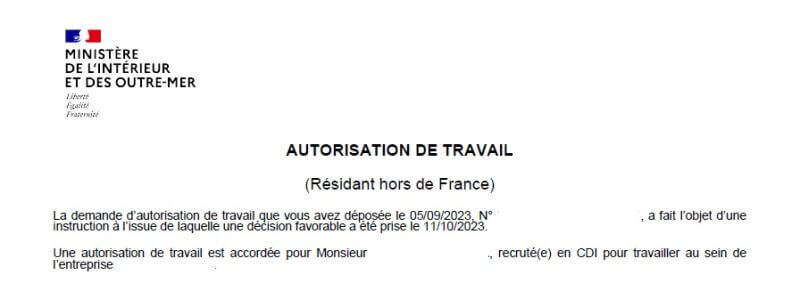
Autorisation de Travail - Work Permit
Can you live in Paris only speaking English?
Absolutely! Many Parisians widely speak English, and France has a huge expat community, especially in the center. Some international neighborhoods in Paris, such as Le Marais, the 6th Arrondissement, the Latin Quarter, and the 16th Arrondissement, make it easy for expats to get by in everyday life.
However, even if you can get by in English, a little French can enhance your overall experience in Paris, facilitate interactions in your daily life, and contribute to a sense of belonging. And it's crucial to note that while English is prevalent, the importance of learning French cannot be overstated. Despite the convenience of English, many French people may prefer to communicate in their native language, particularly in more local or traditional settings. It's not that they can't speak English; rather, there's a cultural appreciation for those who try to speak French.
Don't hesitate to learn French, and it will go a long way to making you feel at home in Paris.
Language schools in Paris, such as Alliance Française, Elfe, and Accord Paris, provide tailored French programs for expats. At Alliance Française, expats can enroll in intensive courses covering everything from basic conversational skills to advanced grammar, helping them meet French language requirements for living in Paris and working. These institutions cater specifically to the needs of expatriates, making learning French for expats both accessible and enjoyable.
How to rent an apartment in Paris as an American expat?
Is it difficult to rent an apartment in Paris as an American expat? Well, it can be a little trying, but it is definitely doable.
A Quick Guide for American Expats Renting Apartment in Paris
Start by identifying the neighborhoods that are right for you. Whether browsing Real Estate agencies or surfing online ads, there's a place for you. Be prepared to do a lot of paperwork - they love it here. Some essential rental documents needed to move to France are proof of income, a work contract, previous tax returns, and a French guarantor. Learn local rental manners and be a charming American during negotiations.
Utilize English-Speaking Specialized Real Estate For A Smoother Rental Apartment Hunting Experience in Paris
Pro tip: Use English-speaking specialized Real Estate Agency in Paris such as Paris Rental for your rental apartment research in Paris, which can adapt you to work the American way. These agencies cater specifically to international clients, providing assistance in English. They offer a more tailored approach, helping you find neighborhoods that suit your preferences and guide you through the documentation process. So, tapping into English-speaking specialized real estate professionals' expertise can be a game-changer for a smoother transition into Parisian living. Soon, you'll be sipping coffee in your own Parisian apartment like a local. Vive l'aventure!
Can I buy an apartment in Paris as an American?
Can a US citizen buy an apartment in Paris? Yes, you can! As an American, there are no administrative barriers to purchasing a property in Paris. Foreigners, including Americans, have the opportunity to buy property in Paris. The French government welcomes international buyers, and no specific legal restrictions prevent foreigners from owning real estate in the city.
However, you have to be aware that when it comes to Real Estate, it's the law of the place where you purchase the property that applies - in this case, French law. And that means that French law will govern the ownership, taxation of rental income, and capital gains in the event of resale.
Buying real estate in France as a foreigner: Key Steps To Follow
Obtain a French Bank Account:
Suppose you're not a resident of France and would like to invest in France to buy a second home or make a rental investment in France. To transfer your currency smartly for your Real Estate investment, open a French bank account and work with a financial expert in France.
Engage with Professionals:
Purchasing property in France is different from in the States. Collaborate with a knowledgeable Real Estate agent specializing in providing expatriates with services for investing in Paris Real Estate. They can guide you through the available options, neighborhoods, market trends, negotiations, and purchase transaction administration without the language barrier being an obstacle.
Legal Assistance:
Work with an English-speaking notary or legal professional experienced in Real Estate transactions in France. They will help ensure that all legal aspects of the purchase are thoroughly examined and executed and ensure you avoid potentially costly mistakes.
Understanding Taxes and Fees:
Be aware of the various taxes and fees associated with property acquisition in France.
Residency Requirements:
There are no specific residency requirements for property ownership in France. However, there is such a thing as a "tax on vacant homes" in France. Imagine you're a homeowner of a secondary residence in France. You use it several times a year and don't rent it out. It, therefore, is empty throughout the year (i.e., more than three months per year). Then, the French government will ask you to pay for the vacant property tax (Taxe sur les Logements Vacants - TLV). To find out if your French property is subject to the vacant property taxes? Get more details in this blog.
What Does a French Property Cost to Own?
When you purchase and own a property in France, the associated taxes and expenses include:
Notary fees
Notarial taxes and fees are essential costs incurred by property buyers in France at closing, covering the land registration tax and the notary's remuneration (emoluments). The notary fees are calculated based on the property's value, collected by French Notaires, and vary according to the property's location and the type of property, whether it is new or old, and whether the sale includes furniture. Typically, the notary fee is around 7% to 8% of the property value for the old property and 2% to 3% of the property price on average for purchasing a new property.
For example, for an old property in Paris worth 800 000 euros, with furniture of 5,000 euros, without taking out a mortgage, the closing costs for the buyer are as follows:
Notaries fees 7 767 €
- Proportional sales fees 6 917 €
- Copies and formalities (estimate) 850 €
Duties due to the French tax authorities 48 511 €
- Registration fees 46 163 €
- Property security contribution 795 €
- Amount of VAT 1 553 €
Disbursements
- Ancillary costs €400
= Total expenses (rounded off) 56 700 €
Total notary costs represent 7% of the purchase price, of which 86% goes to the French tax authorities (Trésor Public).

Click on this link to simulate your notary fees
Annual property taxes (taxe Foncière)
The property tax ("taxe foncière") is a local tax collected annually by French local authorities. For many American expats, one of the most surprising aspects of owning property in France is the relatively low property taxes charged each year to homeowners, given that France is a highly taxed country. It seems that property taxes in France are just about 10% of what is in the United States!
Housing tax on the second home (taxe d'habitation sur les résidences secondaires)
The council tax on second homes is a French local tax levied for the benefit of local authorities. Since January 1, 2023, all taxpayers are no longer required to pay "taxe d'habitation" on their principal residence in France. However, the council tax still applies to second homes. So, if you own a property in France as a second home or a vacation home, you are subject to the council tax on second homes (taxe d'habitation sur les résidences secondaires).
Real Estate wealth tax (IFI)
If your property's net value (value after deduction of debts) exceeds €1,300,000, you are subject to Real Estate wealth tax (IFI).
Homeowner association dues - Condominium charges
If the property you purchase is in a multi-family building (condominium) in France, property owners must pay an annual maintenance fee known as "charges de copropriété." These charges cover the operational and maintenance costs for the collective property, such as the concierge salary, elevator expenses, etc. More precisely, the amount and the distribution of these charges among co-owners are determined by each co-ownership regulation, taking into account the size of each property.
How do you deal with the heat in Paris without AC?
How to deal with the heat in Paris without air conditioning? That is one of the most asked questions from American expats coming to live in Paris. Compared to the United States, where air conditioning is prevalent, Parisian apartments and public spaces may only sometimes be equipped with AC.
Here are some of the most common Paris AC-related questions and practical tips for managing the heat:
Frequently Asked AC Questions:
1. "Do Parisian apartments have air conditioning?"
Air conditioning in Paris apartments is less common than in the U.S. because of climate considerations, architectural and administrative challenges, and government regulations. Some do, especially in newer buildings, but many rely on alternative cooling methods.
2. "How do locals stay cool in the summer without AC?"
Parisians often close shutters during the day to block out the sun and open windows for cross-ventilation in the evening, and recently, portable air conditioning has become increasingly popular among Parisian households.
3. "Can I find an apartment rental in Paris with AC?"
While air conditioning is less common in Parisian apartments, it is possible to find furnished apartment rentals in Paris with A.C. Focus your search on newer or renovated buildings and consider working with Real Estate agencies specializing in international clients.
4. "What alternatives are there to AC for staying comfortable?"
Portable fans, hydration, and adapting to local practices like closing shutters during the day are effective ways to beat the heat.
5."Can I install AC in my Paris apartment rental?"
To be honest, it's sometimes nearly impossible to install air conditioning in your rental apartment in Paris as a tenant because you need permission from the town hall and the co-ownership (syndic). What's more, the mayor's office usually does not authorize alterations to the exterior facades of historic buildings, such as most Haussmann buildings, for aesthetic and preservation reasons.
Practical Tips for Managing the Heat in Paris without AC:
1. Portable Fans And Portable AC Are Your Friends:
Invest in portable fans or A.C.s for easy cooling in different living areas. Mainly, portable A.C. works like magic in a small Parisian apartment.
2. Catch the Local Flow:
Parisians have a routine – shut those shutters when the sun's blazing and crack open those windows when it cools down. Get in tune with the Parisian rhythm and live the Parisian way.
3. Check for AC in Accommodations:
If A.C. is crucial for your comfort, confirm its availability when selecting accommodations.
4. Cross-Ventilate Your Space:
Open windows on opposite sides of your apartment to create cross-ventilation if possible.
So, there you have it - your guide to moving from the U.S. to Paris. With these answers in your back pocket, you're ready for a successful transition to the City of Light. Bon voyage!
Editor: Siyi Chen
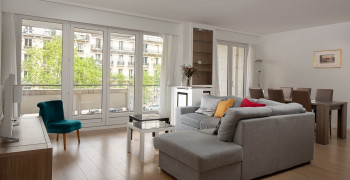


 Français
Français



